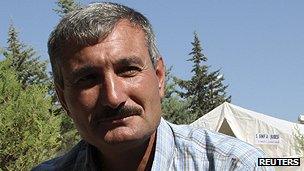Q&A: The Free Syrian Army
- Published
The Free Syrian Army (FSA) claim to have attacked an Air Force Intelligence facility has attracted more media attention to the group of Syrian Army deserters. There are reports that the opposition Syrian National Council has recently met FSA leader Col Riyad al-Asad to discuss the scope for cooperation.
What are the FSA's aims?

Former officer Col Riyad al-Asad now leads the rebel Free Syrian Army
In its founding statement in August, the group said it wanted to "work hand in hand with the people to achieve freedom and dignity, topple the regime, protect the revolution and the country's resources and stand up to the irresponsible military machine which is protecting the regime". Col Al-Asad told pan-Arab Al Jazeera TV in October that the FSA "will continue to offer its men's blood and souls to help our great people get rid of the yoke of that ruling clique".
How big is it?
The strength of the FSA is unknown. The group put its membership at more than 15,000 by mid-October. It has admitted that it would be unable to directly confront the Syrian army, which is estimated to comprise over 200,000 soldiers. According to the FSA, soldiers and officers are defecting every day and are continuously being organized and assigned tasks by the group. On 14 November Col Al-Riyad told the Turkish news agency Anatolia that nearly 400 soldiers, including 15 officers, had defected in the past week in a sign of growing momentum.
Where is it based?
The FSA controls no territory in Syria. Col Al-Asad and dozens of other FSA members are based in a refugee camp in Turkey's southern Hatay province, close to the Syrian border. Both the FSA and Turkey deny that armed men from the camp are crossing into Syria. The FSA says it has 22 battalions in Syria, and is particularly strong around Deraa in the south and Homs in the centre.
How does it operate?
Col Al-Asad says soldiers defecting from the Syrian army operate in their original areas using light arms. FSA Col Malik al-Kurdi told pan-Arab Al-Arabiyah TV that the FSA attacks military units that have themselves attacked or are planning to attack protesters, and employs guerrilla warfare through attack and retreat operations. The FSA also targets non-military security forces, like the Mukhabarat secret police and pro-government militias, and Col Al-Asad says he keeps contact with each of the FSA battalions within Syria by mobile phone and Internet.
What is its position on foreign intervention?
Col Al-Asad has told various media that the FSA wants a UN no-fly zone over the Syria-Turkey border, in order to give defecting soldiers an area within Syria where they can regroup and recruit. He rejects the idea of foreign military intervention. The Al-Haqiqah newspaper of the Paris-based Syrian National Council for Truth, Justice and Reconciliation quoted an aide to Col Al-Riyad as saying that the FSA leader had had meetings with US diplomats in Turkey, under Turkish government aegis, in recent days to discuss FSA needs in terms of intelligence-gathering rather than arms.
Does it have any political affiliation?
Col Al-Asad has denied any political affiliation, and told the Turkish newspaper Milliyet that the FSA sought to make Syria a "Muslim country and a secular democracy" like Turkey. He denied Syrian government allegations that the FSA is linked to the Syrian Muslim Brotherhood, the main Sunni Islamist grouping, although he did acknowledge to Milliyet that all of the FSA troops are Sunnis.
How is it viewed by other opposition groups?
The Syrian National Council (SNC), a coalition of opposition groups sharing the goal of overthrowing the government, expresses sympathy with the FSA while warning against its potential to undermine the peaceful nature of the uprising.
SNC Chairman Burhan Ghalyoun told Al Jazeera TV in October that the FSA could not be ignored but should limit its activities to defending unarmed civilians. As for contacts between the two groups, Mr Ghalyoun said they had "barely started". Col Al-Asad has at various times said there is "full coordination" between the FSA and the SNC on the ground in Syria but no contact at the leadership level.
In the last few days various Syrian opposition sources have reported a meeting between Col Al-Asad, Mr Ghalyoun and other leading figures in the SNC at an undisclosed location. The reports agreed that the two groups were moving closer together in terms of cooperation, but stopped short of announcing a clear link.
The Al-Haqiqah report says this was because of divided opinion within the SNC. Quoting an aide to Col Al-Riyad, it says the Muslim Brotherhood and "pro-US" SNC leaders want Col-Riyad to join the SNC, while Mr Ghalyoun still seeks to maintain a non-military profile for the Council.
BBC Monitoring, externalselects and translates news from radio, television, press, news agencies and the internet from 150 countries in more than 70 languages. It is based in Caversham, UK, and has several bureaux abroad.